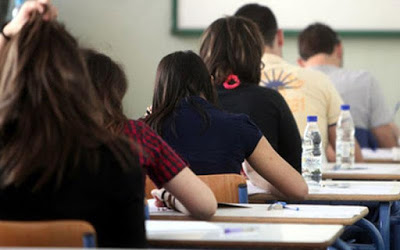This is because the high percentage of excellent students is rather fictitious and does not reflect the real performance of the Cypriots (a look at the results of the Pancyprians confirms the gap between the diploma grades and the exams). On the opposite bank, last year left a bitter taste in 4.907 students. Of these, 4.416 remained unconsidered and 491 stagnant.
In more detail and according to the statistical data of Secondary Education, the following emerges:
Excellent
A total of 11.044 teenagers excelled. In the High School the percentage amounts to 24,5% or 5.591 students. In the Lyceum the percentage is even higher, as it reaches 28,4% (5.453 students), ie almost one in three. As for the gender factor, it turns out that many more girls achieved excellence. Specifically, 31,5% of girls and 17,8% of boys excelled in high school. The corresponding percentages in the high school cycle are 35% and 19,8%. Based on the available data, it also seems that in some provinces there is an "epidemic" of excellence. The most typical example is the province of Paphos, where 36,2% of high school students got excellent (44,1% girls and 25,8% boys). The percentage of Paphos is ten percentage points higher than that of Nicosia, where the students who finished with excellent marks amount to 25,9%.
Competent bodies consider that it is not accidental that the smaller the school community, the higher the grades. In fact, information indicates that last year the Ministry of Education made relevant suggestions to combat the phenomenon, as it is the least paradoxical to have schools where half the students excel. The ministry's remarks seem to be gaining ground. E.g. in Paphos the percentage of the best in 2013-14 exceeded 41%.
The ministry also hopes that with the abolition of the Unified Lyceum and the introduction of directions, a class will enter the school grades. How; As long as students do not have the opportunity to take "easy" lessons, the baccalaureate degree will cease to be fictitious.
Unchecked
During the year under review, a total of 4.416 children were "cut" in the June exams and consequently failed to be promoted. These students have a second chance, so they do not have to repeat the class: they will attend the September exams and if they succeed, they will avoid stagnation. Of the 4.416, 2.958 remained uneducated in High School (12,9%) and 1.458 in High School (7,6%). The number of boys who failed is twice that of girls and specifically, 2.816 and 1.600 respectively.
Stationary
The percentage of students who will sit at the same desks for the second consecutive year, remains low. In High School it does not exceed 1% and in High School it is 1,4%. In real numbers, it appears that 491 children remained stationary, of which 223 in the high school cycle and 268 in the high school cycle. According to the data gathered by the Ministry, most of the affected students remained stagnant not because of their performance in the lessons, but because of the increased number of absences. This finding shows that the stagnation is not exclusively due to the school, but a large share of the responsibility lies with the family environment. Another important fact is that compared to other European countries, the stagnation rate in Cyprus is very low.
Examinations in June
The Ministry of Education is seriously considering postponing the exams in June. Such a suggestion is included in the proposal of the special committee for the Pancyprian Examinations and is accompanied by taking measures to support the examinees. Specifically, it predicts that the affected students will receive remedial instruction at school, before the examinations, for about 15 days.
Regarding this school year, the examinations will be conducted normally, from September 1st to September 7th, according to the program that has been prepared and announced by each school unit involved.
President of OELMEK: Subjective evaluation
The president of OELMEK, Dimitris Taliadoros, pointed out two possible reasons for the large percentage of excellent students. As he said, "the Unified Lyceum gave students the opportunity to choose courses that are considered good or bad easily", in order to have a high grade in the baccalaureate. With the abolition of the United, he continued, these distortions are expected to be corrected. Commenting on the fact that some provinces have increased rates of excellence, he said that "in more closed and smaller societies, this is to be expected, but not right." It is due, he said, to the fact that "the evaluation is not done with objective criteria".
Source: Liberal

